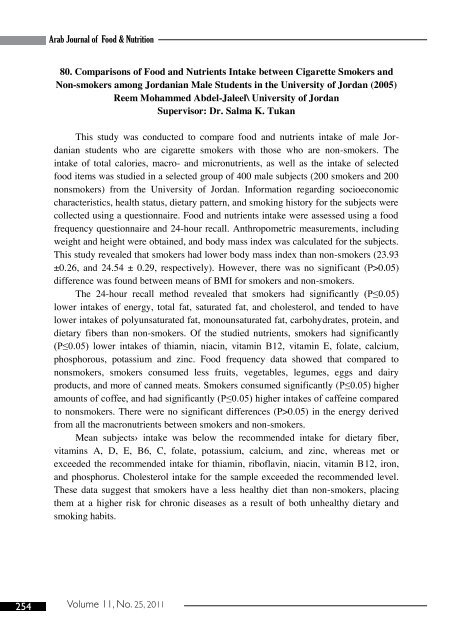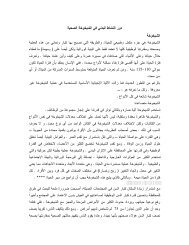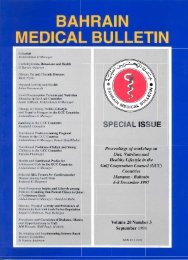Food & Nutrition
Food & Nutrition
Food & Nutrition
You also want an ePaper? Increase the reach of your titles
YUMPU automatically turns print PDFs into web optimized ePapers that Google loves.
Arab Journal of <strong>Food</strong> & <strong>Nutrition</strong><br />
80. Comparisons of <strong>Food</strong> and Nutrients Intake between Cigarette Smokers and<br />
Non-smokers among Jordanian Male Students in the University of Jordan (2005)<br />
Reem Mohammed Abdel-Jaleel\ University of Jordan<br />
Supervisor: Dr. Salma K. Tukan<br />
This study was conducted to compare food and nutrients intake of male Jordanian<br />
students who are cigarette smokers with those who are non-smokers. The<br />
intake of total calories, macro- and micronutrients, as well as the intake of selected<br />
food items was studied in a selected group of 400 male subjects (200 smokers and 200<br />
nonsmokers) from the University of Jordan. Information regarding socioeconomic<br />
characteristics, health status, dietary pattern, and smoking history for the subjects were<br />
collected using a questionnaire. <strong>Food</strong> and nutrients intake were assessed using a food<br />
frequency questionnaire and 24-hour recall. Anthropometric measurements, including<br />
weight and height were obtained, and body mass index was calculated for the subjects.<br />
This study revealed that smokers had lower body mass index than non-smokers (23.93<br />
±0.26, and 24.54 ± 0.29, respectively). However, there was no significant (P>0.05)<br />
difference was found between means of BMI for smokers and non-smokers.<br />
The 24-hour recall method revealed that smokers had significantly (P≤0.05)<br />
lower intakes of energy, total fat, saturated fat, and cholesterol, and tended to have<br />
lower intakes of polyunsaturated fat, monounsaturated fat, carbohydrates, protein, and<br />
dietary fibers than non-smokers. Of the studied nutrients, smokers had significantly<br />
(P≤0.05) lower intakes of thiamin, niacin, vitamin B12, vitamin E, folate, calcium,<br />
phosphorous, potassium and zinc. <strong>Food</strong> frequency data showed that compared to<br />
nonsmokers, smokers consumed less fruits, vegetables, legumes, eggs and dairy<br />
products, and more of canned meats. Smokers consumed significantly (P≤0.05) higher<br />
amounts of coffee, and had significantly (P≤0.05) higher intakes of caffeine compared<br />
to nonsmokers. There were no significant differences (P>0.05) in the energy derived<br />
from all the macronutrients between smokers and non-smokers.<br />
Mean subjects› intake was below the recommended intake for dietary fiber,<br />
vitamins A, D, E, B6, C, folate, potassium, calcium, and zinc, whereas met or<br />
exceeded the recommended intake for thiamin, riboflavin, niacin, vitamin B12, iron,<br />
and phosphorus. Cholesterol intake for the sample exceeded the recommended level.<br />
These data suggest that smokers have a less healthy diet than non-smokers, placing<br />
them at a higher risk for chronic diseases as a result of both unhealthy dietary and<br />
smoking habits.<br />
254<br />
Volume 253 11, No. 25, 2011
















